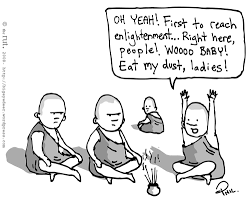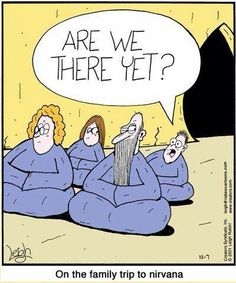Am I here to get enlightened?
 Jeroen
Not all those who wander are lostNetherlands Veteran
Jeroen
Not all those who wander are lostNetherlands Veteran
I’ve got a dilemma. I was listening to an Osho discourse (from I Say Unto You, volume 2, discourse 6), and a question came up which went “I’ve been at the Ashram for a few days, and I was wondering: am I here to get enlightened?” Osho’s response to this was that if you turn enlightenment into a goal, you’re unlikely to ever achieve it. Instead one should live joyously and with awareness and creativity, being open to let enlightenment arrive whenever it comes.
Now, i usually seek to find a middle way between science, Osho and the Buddha, with ehipassiko as a general guide, but in this case it seems there is a collision between what the Buddha says and what Osho says. The Buddha holds that there is a path to enlightenment, that the fruits to that path can be achieved in one lifetime, and that one should make every effort to get there.
Now Osho is well known for tailoring his answers to the questioner, and if someone with a more serious seeker’s attitude had asked the same question there might have been another answer. Yet it still gives me pause, that rather than encouraging someone to take the search seriously Osho would say, focus your energies on just living joyously. It feels with this question as if it was meant for me.
So I thought I would ask you all what you thought of the search for enlightenment, did you make it a serious goal?



Comments
At one time I did. Now I spend most of my energy on being a good person because that in itself an admirable goal, in my opinion.
The Stoics often said virtue is its own reward. Epictetus, for example, argued that there's no reward for a person greater than doing what's good and just. In response to one of his students, who asks what good can be expected from the development of virtue, Epictetus says, "What greater good do you look for than this? You were shameless and shall be self-respecting, you were undisciplined and shall be disciplined, untrustworthy and you shall be trusted, dissolute and you shall be self-controlled. If you look for greater things than these, go on doing as you do now: not even a god can save you."
And the older I get, and the more I look around at the world around me, the more I'm inclined to agree that this, in and of itself, is indeed reward enough. A virtuous person is as rare as gold and twice as precious.
I think being a good person can lead to living a joyous life, and that can lead one to awakening. But I say use whatever raft works for you.
At first it did cross my mind...

But after awhile I became so engrossed in Dharma practice that I no longer craved enlightenment...
Now I just practice the Dharma as best as I can, with no special goal in mind.. )
)
(I should add...that "I" know of...but the mind may have different plans, which it's not sharing with me
Don't practice to become enlightened...Let your practice be the natural expression of your enlightenment
~Dogen~
Abou Ben Adhem (may his tribe increase!)
Awoke one night from a deep dream of peace,
And saw, within the moonlight in his room,
Making it rich, and like a lily in bloom,
An angel writing in a book of gold:—
Exceeding peace had made Ben Adhem bold,
And to the presence in the room he said,
"What writest thou?"—The vision raised its head,
And with a look made of all sweet accord,
Answered, "The names of those who love the Lord."
"And is mine one?" said Abou. "Nay, not so,"
Replied the angel. Abou spoke more low,
But cheerly still; and said, "I pray thee, then,
Write me as one that loves his fellow men."
The angel wrote, and vanished. The next night
It came again with a great wakening light,
And showed the names whom love of God had blest,
And lo! Ben Adhem's name led all the rest.
If the Dalai Lama says that his Religion is Kindness, there's much to be said for walking in his footsteps rather than stumbling awkwardly in the Buddha's....
Yes.
http://newbuddhist.com/discussion/25213/claiming-enlightenment
Most definitely.
http://newbuddhist.com/discussion/25738/wot-not-enlightened
https://www.lionsroar.com/what-is-enlightenment-2/
Life is full of surprises...perhaps enlightenment will be one of them...
With Great expectations...often comes Great disappointments...
Enlightenment seems like a red herring to me. A sweet intangible something being dragged along the path - helpful at first, but then at some point it heads off at right angles and if you follow it, you are led astray.
The unrecorded beatitudes
"Blessed are those who seek no reward, for yea truly shall they not be disappointed...
Blessed are the cynical for yea truly they will rightly mutter "I told you so!"
When I started on the Buddhist path it was taught to me that setting a proper intention at the start of ones practice, as well as dedication at the end, was important. I've always started my practices by saying a basic TB prayer
The term enlightenment still is a pretty vague idea to my western mind and it never really sunk in as I said those prayers so I modified the latter half to
I was initially drawn to Buddhism to address my own suffering and that still is an important factor, but a large portion of my attitude in cleaning up my mind and developing positive mental qualities, knowledge and wisdom has to do more with the effect it will have on those I interact with and the ability I have to help others lead happier, more fulfilled lives.
Also, progress tends to be incremental and one doesn't have to be perfectly enlightened to be less harmful and more helpful than they were yesterday. So to me Osho's response probably was more about taking a relaxed attitude and appreciating the journey rather than saying you don't have to make any efforts in that direction.
Buddha was enlightened, Osho was not. Going with Buddha on this one .
Indeed.
One can seek enlightenment by practicing meditation, but how should we practice so that we can attain enlightenment? Total and complete enlightenment is not attained easily. One must develop small moments of insight and understanding each day. These small, daily bits of enlightenment accumulate over time, until they culminate in a sudden flash of great enlightenment.
Ven. Master Hsing Yun
I knew there was a plan ...
Go Buddha! Go Buddha! Go Buddha!
gate, gate etc ...
Gate Gate Paragate Parasamgate Bodhi Svaha - Prajnaparamita mantra translation: "Gone, gone, gone to the Other Shore, attained the Other Shore having never left."
The idea of enlightenment is like dangling sweets in front of little children to get them out of the burning house.
"Bhikkhus, all is burning. And what is the all that is burning?
"Burning with what? Burning with the fire of lust, with the fire of hate, with the fire of delusion. I say it is burning with birth, aging and death, with sorrows, with lamentations, with pains, with griefs, with despairs."
"Seeing thus, the well-instructed disciple of the noble ones grows disenchanted"
"Disenchanted, he becomes dispassionate. Through dispassion, he is fully released."
It shifts the whole question of motivation from ‘enlightenment’ to ‘freeing the mind’, which is one way to handle the problem. It seems like you decided to move the chasing of enlightenment to another time, which is something I have some sympathy with.
I think that’s a very beautiful motivation. If that’s what is at the heart of your Buddhism, then it’s a very worthwhile thing.
For me, Buddhism is a very many-sided tradition, with different approaches to problems that people may have. It has value for your life in many different ways, whether you determine to chase enlightenment or are just looking for stress relief through meditation.
Attachment leads to suffering. So path is to let go of attachments. What then is the result when attachment and suffering end?
Weekends free of housework, and lemon cake...?
It makes me feel somewhat better, to see that there are so many Buddhists who do not set themselves to the idea of achieving enlightenment. I had always thought that enlightenment had to be the goal, and in a way realising that it’s not so for everybody is a release.
I think this is an idea that goes back to my childhood in the communes, and that that is why it resonated so strongly with me. It is kind of tied up with my ideals of ambition and achievement, but to be free from it feels good.
Maybe getting at what Osho was talking about is a goal oriented approach, chasing enlightenment as you say, vs a process oriented one. I just know when my mind is consumed with anger or attachment I am less happy and fulfilled and my interactions with others produce less happiness. So I take actions in my day to day life that encourage peace and discourage agitation. Its not about getting some grand state at the end so much as it is about encouraging positive attitudes in my life. If someday down the road those actions result in enlightenment, so be it, if not that is fine too.
I wouldn't say its at the heart of my Buddhism, I don't want to give the impression that I'm some sort of saint, far from it. I would say its an attitude that I try to cultivate as an integration of compassion into my practice that has had a degree of success.
Yes, we can all take different things from the teachings. It was my intent to say something to that effect in my first response, but forgot as I got into it.
Osho’s approach is quite unique, he doesn’t look at processes or paths or goals. He just gave darshans, talked on a range of spiritual subjects and answered disciples questions. I value him for his talks on joy, freedom, and meditation.
In a way I find it more modern, more unrestrained than Buddhism, which is a definite path with things you are supposed to do and not. In many ways I find that buddhism’s focus on awareness and inner exploration can lead you to a blossoming, but Osho’s wisdom and path of meditation gives you the spaciousness for it.
Flour and yeast....
I think I can see a difference in what each of us may need out of the path. I've never been very ambitious, hardly at all really. I came to the spiritual path out of living a 90s slacker life. So for me the struggle was to add the order and structure of the Buddhist path to add meaning to a meaningless life which produced a happier more fulfilled existence.
If you're maybe coming from the other end where you have ambition and want achievement, and maybe as an engineer (right?) tend towards an ordered and structured mind set, openness and spaciousness would be the best medicine.
The ways toward enlightenment are not free. Even cheesecake has a price.
... meanwhile it sounds like a good plan
And now back to the entertainment of seeking the Perfect Cheesecake (use stevia?)
OM MANI PADME ... HUM JEEZE KAKE
Yes. 'You' are here to (en)lighten your burden.
Yes, I think there is some truth in that. I ended up achieving those ambitions, but I’m only now beginning to find where some of the ways of how I’ve grown have limited me, such as a great liking for logic and structure. I never realised how logic restrains ones being, that it ultimately leads you to a lot of dead ends.
There is a lot to learn from Buddhism, but I’m finding not everything can be found there. It’s a question of being aware of your inner compass, your intuition, as to what you need on your spiritual journey.
In terms of 'what are you here to do...', no one can answer that for you.
Enlightenment is a somewhat nebulous concept - at one end it applies as an individual's ability to apply reason, based on objectively agreed knowledge, from that individual's point of view as delineated from the collective; so I suppose this would translate to one individual appreciating causal connections that others do not and that this may be justified by the group agreed knowledge / reason as objectively the more justifiable of the juxtaposition.
For example, if I can fix a car and another individual cannot, I am enlightened as to the workings of a car.
At another end, enlightenment is characterised as an impassable barrier, where the agreed characteristics take on inhuman and seemingly unachievable traits such as omniscience or omnipotence - for me, I think this translates as support of a hierarchy or the integrity of an institution, mainly because under closer examination, the issue becomes increasingly opaque or vague.
For example, why should the open disclosure and demonstration of supernatural abilities as a result of spiritual / religious achievement be so shrouded in mystery and conjecture when they would be the best example or core of the incentive to undertake such a process.
As I am now, I see myself as not subscribed to any institution and as I do not seek to follow or lead, there is no requirement for me personally to subscribe or unsubscribe to a concept of 'enlightenment'.
For me, it is another interesting facet of the human condition.
That said, for as long as I can remember, I have been fanatically obsessed with this reality and my responsibility for it, in it and as a result of it.
So let me see if I understand you. Causation, and thus an enlightened awareness of it, only exists because we all agree it does? And that it is ultimately an intellectually graspable state?
Or classically defined Buddhist enlightenment is a collective narrative that doesn't correlate to an actual state of mind but is only used as a means to consolidate power in a hierarchy? It isn't defined in such subjective and ineffable terms because it actually is personal and subtle, but rather as a way to avoid investigation or criticism by those lower down in the hierarchy?
I remember the last time we interacted and it was much the same thing. Personally I think you're over applying the concept of emptiness into complete arbitrariness and could use to learn about Nagarjuna's Two Truths.
I don't think those were my points.
I was responding to two questions: (1) Am I here to get enlightened? To which my thought is, noone can answer that for you; and
(2) What are your thoughts on the search for enlightenment and did you make it a serious goal.
To address that, my thought on 'enlightenment' is that it is a nebulous concept and broadly I provided 2 examples of the range of definitions and how they translate in my search.
Finally I tried to provide my view on what may or may not be a 'serious goal' for me.
My participation in that previous discussion concluded at:
"For me, I don't think its that simple, truth is a nebulous concept. Here I'm probably sounding like I'm talking out of both sides of my mouth and agreeing more with @Zero's point."
I'm aware of the two truths doctrine.
search for enlightenment?being enlighten is normal,by just living an encountering things that peak our interest.i.e. enlighten by the quantum field on pbs.who said,mathmatician cant be poets.string theory is poetic .
is enlightenment a goal? yes.the intention of a bohdisattva,is to be of use and applying ones bodhi,or enlighten mind ,for the benefit of others,in the sympathetic joy or victory in the enlightenment of others.
now being awake is more subtle.enlightenment is the growing process,culminating in the mind being awake with all jazz,gnosis,intuition,one with dao or buddha dharma.
Quite the reverse.
Becoming awake is the purpose of the Buddha, the Dharma and the Sangha. Everything else is red herrings.
A sweet intangible something including the pseudo Buddha we kill in Zen stories is when we are on the right path.
One of us is astray. Many Buddhists have experienced and awakened in the same way the Buddha did. Maybe some have not. Nobody said it would be easy, they said it would make us at Ease.
http://newbuddhist.com/discussion/18309/what-use-are-unenlightened-teachers
One of the pitfalls of goal setting...

An ambiguous statement on my part. Enlightenment is a word, that to which the word refers is a mental state. On the journey to a given mental state, words are useful up to a point, but past that point they may become a hindrance. Go on a little farther, and they no doubt become useful once again.
Bravo @Fosdick
Exactly so.
First there is a mountain. Mohammad goes to it.
Boom.
No mountain.
Then there is a mountain.
Enlightenment
Talking of misunderstanding ... here is a little red herring - yum
https://tricycle.org/magazine/first-there-mountain-then-there-no-mountain/
I am, @lobster, ceaselessly amazed at the amount of useful and relevant information and understandings that you can come up with - most of it stuff I myself never heard of before - and on short notice to boot. Gassho beaucoup.
All you need is a time machine
https://tinyurl.com/yyoafmqf
Are we here to become enlightened?
Perhaps
1, Enlightenment is not a goal in and of itself
2. Enlightenment is more a process than and endgame
3. Self growth and the nurturing of wisdom, compassion, empathy, kindness are part of the process
4. Enlightenment is not the same as knowledge though knowledge is usually good to
have.
Possession of a PHD shows one to have great knowledge in a specific field but does
not make one wise or compassionate, etc.
there is more, but this is a something to start with.
Peace to all
Good start
Everything is a Good start
startlingly